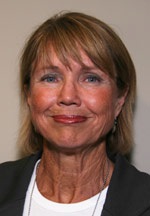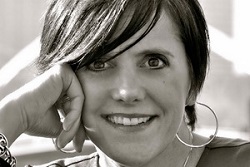
Dr Nancy Canon O’Connell has a PhD in Economics and for many years worked and in the corporate world of finance, health care and technology. Unsettled by a change in lifestyle when she re-located with her husband to California, a friend put her on to a Transition Coach, with whom she worked for two years. This was not a natural for her, she was not used to talking about what she calls the “touchy-feely” stuff. As the coaching progressed, Nancy’s began to look at her life differently, she felt more grounded and in control. A 3-day workshop at the Hudson Institute turned into coach training and in 2007 she graduated. She surprised herself, as all her life she had been a problem solver and now she was working with people, listening rather than offering strategy. For her the revelation was that working as a coach she was happier than she had ever been.
Nancy is a case of a successful coach with several decades of business experience, a wide professional network and highly regarded in her field. Two years ago she was a full time coach, travelling regularly to see her clients in Silicon Valley and across the country as well as sitting on the boards of several non-profits. Now she is winding back her coaching down to 50% of her time. She does not market her services anymore.
Key things I learned from Nancy Canon O’Connell:
Have your own coach, like she does, whom she has been with for the past 10 years
With coaching, the more you do the more you see how it all blends together irrespective of niche
60% of her clients come through word of mouth
Expect to spend 4-6 hours a day on coaching prep work
Coaching should not be weekly as clients need more time to process and integrate
Ideal coaching session runs 90 minutes
Clients should never see their sessions as an obligation
The client owns the work – the coach is the accountability partner
http://cannoncollaborations.com/executive.htm

Alisa Cohn is a New York based executive coach and self-described seeker. Early in her career as an executive assistant she saw a brilliant facilitator and executive coach at work. It left a powerful impression – this was something she could see herself doing. Drawn to business studies, she completed her MBA at Cornell University. But once she was out in the workplace she discovered the corporate life did not suit her – six months in Integrated Services at PWC was not what she wanted. Looking for challenge she joined a start-up as Head of Strategy. That led to another start-up as CFO. Both ended badly. It was time to do what she really wanted and become a full time coach.
The first three years were very tough, but with sheer determination and a strong desire to make a difference, she built up a sold base of clients. Financially it was a huge struggle and it was only into the fourth year that she could support herself with her coaching/facilitating work. Even now, her work requires a lot of “hustle and discipline.” Her clients are mostly male working in venture capital. She works with a typical client over a six-month scoping period, meeting every week or fortnight. Her key themes are about power, influence and charisma.
A typical week for Alisa is a mix of face-to-face executive coaching, facilitation and networking. Her website is rich with content, she produces a regular newsletter and writes during her downtime. Her naturally optimistic and outgoing nature has led to her being a regular media commentator, and an enthusiastic networker.
When asked about any challenges she sees in the future of coaching, Alisa says that she does not think about coaching itself, instead she invests all her thinking and energy in her clients.
My main takeaway from Alisa was simple
Work hard, give it a few years, network constantly and stick to it!
Watch a recent presentation by Alisa on Building Your Influence

A hard worker and true original is Penelope Trunk – well known for her Brazen Careerist blog and four start-up businesses. She is also a successful coach and home-schools her two boys on a farm in Wisconsin. She is a reluctant coach, but it is a lucrative activity that allows her to work from home. Her long commutes (it adds up to many hours on the road) to take her son to cello classes is her coaching time.
Key to her success as a coach is her profile as a blogger and businesswoman. She began her blog in 2001 and it took eight years before she earned anything from it. Now she has a following of more than 100,000 – earned from her provocative and unique view of life, work and family. She has no problem attracting coaching clients.
Penelope has an innate ability to read people in a very short time She has a laser like focus – listening to the words, the tone of voice and the content. But its what she does with this information that puts her in a different category to those of us working towards ICF credentials.
When I tell her I’m interviewing her for a research paper as part of my coaching training she questions why I studied coaching – in her opinion it’s not a skill that can be learned. Clearly we are off to a bad start!
She has strong opinions; she intervenes and is confrontingly explicit with advice. This directness can be uncomfortable but strangely cathartic. When she asked me what Meyers Briggs type I am (INTJ), she disputed this – absolutely not – and went on to explain why I am INFJ because an INTJ type is motivated by achievement and money and is indifferent to what others think. She is right.
She took control of the interview and turned it around to focus on me. I allowed this to happen, curious to hear her in action. She was remarkably accurate about many things picking up on deeply personal issues big and small. I was unsettled for days afterwards, thinking about how she challenged some of the assumptions I have about myself. This was an interview that left me deeply thoughtful – it still does, weeks later.
Penelope’s approach works for people who are looking for strong direction and immediate answers. Most of her coaching clients require just one session, and they will walk away with plenty to work on afterwards. She charges $350 per hour and you can see from the feedback on her website that it works. She was charging $500 per hour but the fee attracted a different, less interesting client. By dropping her fee, she is working with stimulating clients on topics she knows.
What I learned from Penelope
Build a strong online personal blog (see the link below)- this is how people will get to know you
Winning clients is all about marketing
Confidence is essential to coaching

Melbourne based Carolyn Tate runs the appealingly titled Slow School of Business that works with purpose-driven companies and individuals. I work with people whose values put people ahead of profits. In her opinion, a person’s values apply to both personal and working life, and cannot be separated.
She seeks out what she calls conscious pioneers. While that sounds a bit new age, she is passionate about working with like-minded individuals and businesses that have the capacity for deep listening, acute observation and open dialogue. The intention is to enliven business practice from the inside and out with principles of well-being that ripple out into society.
Clients are asked to question their activities, their output – does what I do make the world a better place and if so how? She facilitates group work and does presentations along her themes of values-driven business. She also offers peer-to- peer coaching at the Slow School, where coaches get together to coach each other. Its a great outlet for coaches and an opportunity to experiment and share knowledge.
Carolyn comes from a marketing background, and began using coaching as a tool in the delivery of large marketing plans. Coaching was a methodology that worked well to ensure that teams carried out large projects with conviction.
The common theme she comes across is a feeling of disengagement from work and a desire to find more meaning in work and life. For some that disconnect leads to escaping corporate life to become an entrepreneur. For others looking for a way out, this may be the time to “do the work” and stay where they are to effect change from within. Too many people play the victim, and see themselves as helpless to make changes within the organisation. Carolyn encourages her clients to take a different attitude and find ways to make a difference – to discover the power they do have and that will create meaning. For her it’s all about ethics, values and having a clear purpose.
A passionate believer in the benefits of coaching, Carolyn has her own coach for strategic thinking with whom she talks regularly on Skype. Despite both living in the same state, they have never met face to face. She uses peer coaching for the transactional details of running a business. She recommends that everyone should have a coach, even within families.
Carolyn coaches, mostly informally she admits, on the topic of purposeful marketing. Coaching comes naturally to her and she uses it opportunistically when she senses the time is right. While she has practiced coaching for 14 years, she has no formal training or certification – it was something she picked up and is a useful tool in conducting both of her businesses.
Her greatest challenge? Finding businesses and organisations willing to explore greater meaning and question some of the bedrock beliefs. It’s very challenging for organisations to rethink its operations to embrace purpose-driven values because it could affect the bottom line.
What I learned from Carolyn
Have your own coach – it is a constant that keeps you working on what’s really important to you
Be spontaneous: use coaching at times when it makes sense, it doesn’t have to be used strictly in a formal coach/client session
http://carolyntate.co/
http://carolyntate.co/slowschool/
What I learned from these successful coaches
Training/studying coaching is no guarantee of a successful career
Expect that building a stable client base can take years and requires constant
output and presence
Be consistent, patient and persevere
Continue to learn – stay interested and involved in your subject, learn from others
Give back where you can
Believe in the benefits of coaching